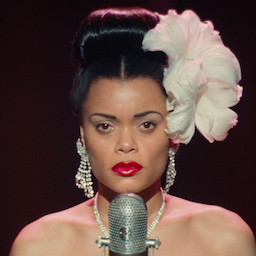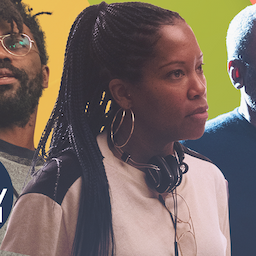The singer opens up to ET about losing 39 lbs in order to embody the legendary singer onscreen.
After breaking out in 2015 with the empowering hit single, “Rise Up,” Andra Day is about to make a bigger name for herself, portraying legendary jazz singer Billie Holiday in Lee Daniels’ biopic, The United States vs. Billie Holiday. This marks the first lead onscreen role for the 36-year-old performer, who opens up to ET’s Rachel Smith about the dramatic transformation she went through to embody the 1940s icon.
Not only did Day have to work on her vocals to match Holiday’s distinct voice and singing style, which includes her unique way of manipulating phrasing and tempo, but she also lost 39 pounds to match the singer’s physique. She reveals she worked with trainers and had a food delivery service to help her during the transition. But she also admits her methods of getting to her desired weight and size wasn’t always ideal.
“To be honest with myself, it is not great to say, I did starve myself a lot when I was on set,” she says, adding that by doing so it made her skin sag and helped physically slow her down to Holiday’s persona. “I am fast and Billie is like molasses. So cigarettes slowed me down, alcohol slowed me down, starvation slowed me down, not sleeping slowed me down and I needed it.”
She adds, “I had to feel her in my body.”
Because Day took up smoking and drinking for the role, she recalls her body being like, “What the f**k is going on?” But eventually she found peace with it, knowing it was only for the film. “I just had to trust that this was the place I was supposed to be in.”
Day also had to put a lot of her trust in Daniels, who has become a game-changing figure in Hollywood, thanks to his previous work helming films like Precious and The Butler as well as TV’s Empire. This is the person after all, who brought Oprah Winfrey out of acting retirement and earned Mo'Nique an Oscar. “Trusting him was very easy and his vision is impeccable,” she says. “Just the way that he strings a scene together, the way he wants to draw on human moments.”
He was able to help her navigate her performance, pushing it here, pulling it back there, to the point where Day realized she was cast for a reason. “Once we embarked on the journey together, he saw Billie,” she says.
“If I told her to jump off a cliff, we were willing to do that together,” says Daniels, who admits that she was not his first choice and that he auditioned a couple of bigger names. “I came close to hiring one. But then, you know, when [Andra] opens her mouth.”
Blown away by her tryout, the filmmaker found himself convincing her to take the job and all the hard work would be worth it. “And that's what happens when you have actors that trust you."
The United States vs. Billie Holiday, which starts in the 1940s, recounts the unapologetic icon’s fierce battle with the federal government, which targeted her in its escalating war on drugs and tried to stop her from singing the controversial ballad “Strange Fruit,” which protested against the lynching of Black Americans. At the time, the singer was also battling drugs and alcohol addiction and often found herself in relationships with abusive men, much of which is seen here as well as in the 1972 film Lady Sings the Blues.
Ahead of its Friday release on Hulu, Day’s unforgettable and soul-filled performance has already garnered considerable awards season attention as well as two acting nominations for Best Actress at the Critics Choices Awards as well as the Golden Globes, which also recognized her in the Best Original Song category for “Tigress and Tweed,” a record Day and Raphael Saadiq wrote for the film.
But accolades aside, the film is bringing Holiday’s story back to the screen for the first time in nearly 50 years and recognizing her not only for her musical contributions but as a hero who stood up against racial injustice in the early days of the Civil Rights movement. It’s also being released almost a year into the current Black Lives Matter movement.
For Daniels, it was an opportunity to “give voice to a woman that we only know for her songs. We don’t know her as a hero -- and I didn’t know she was a hero. She was out in the streets, fighting for that song to be sung and for us to hear it.”
“I think it is important to tell [this story] because it is relevant. It will always be relevant,” Day says, adding that “if we are going to break down systems of oppression and prejudice and racial injustice, break down this huge institution that it is, we have to start by telling the truth and these stories, and understand people's contributions.” Especially those stories we have not yet told or told enough.
RELATED CONTENT:



